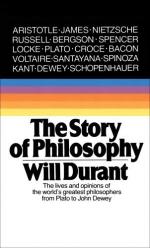
|
| Name: _________________________ | Period: ___________________ |
This test consists of 15 multiple choice questions and 5 short answer questions.
Multiple Choice Questions
1. What does Kant set out to prove is innate and does not come from experience?
(a) directional sense
(b) common sense
(c) moral sense
(d) religious sense
2. How does Schopenhauer develop his blunt manner, realistic mind, and knowledge of the world and of men?
(a) his informal education
(b) his frequent travels
(c) his exposure to business
(d) his time in the military
3. What had Kant determined to be a Thing-in-Itself that can be conceived in thought but not experienced?
(a) eventuality
(b) ultimate reality
(c) history
(d) conceptuality
4. What, according to Schopenhauer, is the only way to convince someone?
(a) appealing to self-interest
(b) applying force
(c) applying philosophy
(d) appealing to reason
5. What concept does Spencer share with Schopenhauer?
(a) reality cannot be determined
(b) human effort is futile
(c) philosophy is an illusion
(d) everything is chaos
6. As Russell visits China, he develops new perspectives and better understanding of a profounder culture to what effect?
(a) his mathematical formula is proven
(b) his habits change
(c) his philosophic systems loosen
(d) his curiosity grows
7. How does Schopenhauer say people rationalize the things they acquire?
(a) reasons are found after getting what is wanted or willed
(b) only wanting things that have a built in reason
(c) reasons are manufactured to suit the climate
(d) a need to keep current in a changing world
8. Without what does Kant say sensations cannot become perceptions?
(a) action and reaction
(b) hot and cold
(c) time and energy
(d) space and time
9. Who is the author of Time and Free-will?
(a) Spencer
(b) Schopenhauer
(c) Descartes
(d) Henri Bergson
10. What does Nietzsche he write about in Thus Spake Zarathustra?
(a) Confucius
(b) Ra-Aman
(c) Buddha
(d) Zoroaster
11. What is Kant's critical analysis of the moral basis of religion?
(a) The Critique of Science
(b) The Critique of Theology
(c) The Critique of Scriptures
(d) The Critique of Practical Reason
12. Where does Spencer say that Religion is central?
(a) in the life of rural communities
(b) in the life of clerics
(c) in the life of primitive civilization
(d) in the life of advanced civilization
13. On what does Spencer say the soul of men living humble and precarious lives relies?
(a) more on reality than on possibility
(b) more on future hope than reality
(c) more on guidence than education
(d) more on mythology than on science
14. What does Kant classify as a result of an oligarchic constitution wherein the spoils of war go to a greedy few?
(a) the constant religious wars that go on in the world
(b) the expansion and conquests of the Prussian regime
(c) the militarism of Europe's expansion into America, Africa and Asia
(d) the European revolts again divinely appointed kings
15. What affects Schopenhauer as he travels through France and Austria?
(a) the philosophy of the post-revolutionary period
(b) the clashes between the Catholic church and Protestantism
(c) the chaos, poverty, unrest and misery of the towns he visits
(d) the severe changes in the weather
Short Answer Questions
1. What is Schopenhauer's masterpiece?
2. What does Kant insist must be absolute and derived only from the inner self by direct perception and intuition?
3. What does Spencer call a rationalizing myth for belief that defies conception?
4. What does Spencer label as the art of methodical self-confusion?
5. What does Spencer define as the subjective accompaniment of mechanically evolved nerve processes?
|
This section contains 549 words (approx. 2 pages at 300 words per page) |

|




